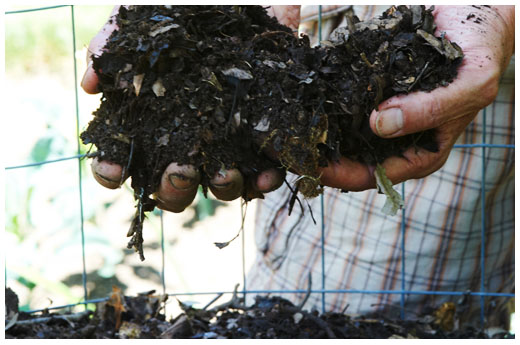By guest blogger Coach Mark Smallwood. Just as the statement “milk is milk” is patently not true, so is the idea that all compost is created equal. Here at Rodale Institute we’ve been making compost for decades. But it wasn’t until recently that we started to look at our compost under the microscope and discovered that not even all of our compost was created equal.
Organic Gardening

Not All Compost Is Created Equal

DIY Seed Starting
By guest blogger Robyn Jasko. Instead of buying transplants this year, you can save a ton of money by growing your own tomatoes, peppers, eggplants, kale, lettuce, and herbs, and more from vegetable starts—for just the price of a packet of seeds and soil. Here are a few simple ways to grow your own seedlings without buying expensive seed-starting setups or kits.

Slow Knowledge
by guest blogger Tim Mountz. rowing things takes time and patience—some seeds can take years to germinate, some soils take years to build up. Compost does not happen in a day. This is why I like the company of gardeners and farmers, not just for the humility that dirty fingernails brings, but also because they are just about the last people on earth who have patience in this ever-faster spinning world.

How to Decode Your Seed Catalog
by guest blogger Robyn Jasko. The seed catalogs that have probably filled your mailbox over the past few months are awfully tempting with their gorgeous pictures and fancy new varieties, but with so many terms (organic, hybrid, open-pollinated, and such) used to describe them, what does it all mean? Here’s a quick guide to help you decipher your catalog…

Gardening in Fall: What We Grow in October
by guest blogger Tim Mountz. Most people are shocked to find out that someone whose nickname is Timato loves October and fall so much. But fall is such a great time to be in the garden, with its bounty of produce, the return of much-needed rain, and the disappearance of bugs and weeds. Everything seems to slow down and say, “Go ahead, grow what you want; we’re done.”

Why Organic?
by guest blogger Coach Mark Smallwood. The latest media buzz over the Stanford study is a bit of a non-event here at the Rodale Institute. The study asks the question, “Are Organic Foods Safer or Healthier than Conventional Alternatives?” It is a good question, one that many citizens. But, the fact is the researchers didn’t really answer it.

Help Honey Bees Survive This Winter
By guest blogger Heather Mattila. Honeybees are far and away the most important pollinator in today’s agricultural landscape. They pollinate more than 400 crops worldwide, help to create about a third of the food we eat, and contribute an estimated $12 billion to our nation’s food supply. But where do they go in winter? The answer might surprise you!

6 Easy-to-Grow Plants That Heal
by guest blogger Isaac Eliaz. As an integrative physician, I rely on herbs and botanicals to help promote optimal health. Medicinal herbs have evolved to provide a variety of beneficial natural compounds, such as antioxidants and phytonutrients, which support good health in numerous complex ways. In fact, many traditional herbalists insist that our best medicine can be found growing closest to us, fresh and in season.
Scratch
Raised on America’s first organic farm, Scratch author Maria Rodale learned how to make everyday favorites from, yes, scratch — the way you remember them; the way they turn out best.
Order NowMost Popular
Organic Manifesto
Drawing on findings from leading health researchers as well as conversations with both chemical and organic farmers from coast to coast, Maria Rodale irrefutably outlines the unacceptably high cost of chemical farming on our health and our environment.
Order Now


